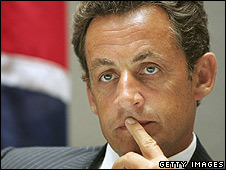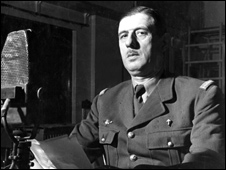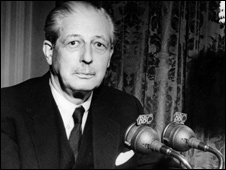Yrys
Army.ca Veteran
- Reaction score
- 11
- Points
- 430
Nicolas Sarkozy challenges France's version of history

President Sarkozy has taken his
country back into the Atlantic fold
Earlier this week, French President Nicolas Sarkozy said his country would end four decades
of self-imposed isolation and return to Nato's military command.
Here, the BBC's Allan Little reflects on France's long journey to reconcile itself with one of the
darkest chapters in its history and its difficult relationship with the US and the UK.
There is a story about a conversation between General de Gaulle, who, as president of the
French Republic, telephoned his American counterpart Lyndon B Johnson, to inform him that
France had decided to withdraw from the North Atlantic Treaty alliance.

De Gaulle sought to diminish US and
British influence on foreign policy
Since its foundation nearly two decades earlier, Nato had had its headquarters in France. Now
Nato would have to move. Furthermore, de Gaulle added, it was his intention that all American
service personnel should be removed from French soil. "Does that include," Johnson is said
to have replied, "those buried in it?"
Ouch.
Anti-Americanism
But go to the cemeteries of Normandy and you see what an Anglo-Saxon business the D-Day
landings - and the liberation of France - really were.
The historian Andrew Roberts has calculated that of the 4,572 allied servicemen who died on
that day on which, in retrospect, so much of human history seems now to have pivoted - only
19 were French. That is 0.4%. Of the rest, 37 were Norwegians, and one was Belgian. The rest
were from the English speaking world - two New Zealanders, 13 Australians, 359 Canadians,
1,641 Britons and, most decisively of all, 2,500 Americans.
After the disastrous Suez crisis in 1956, it fell to Harold MacMillan as UK prime minister to move
Britain from the Age of Empire to the Age of Europe. But his attempts to take the United Kingdom
into what was then called the Common Market fell foul of General de Gaulle's famous vetoes.
Twice Monsieur Non listened politely to Britain's plea, and twice he slammed the door. De Gaulle
saw in British membership the Trojan Horse of American imperialism in Europe.
After Algeria won its independence from France in the early 1960s, de Gaulle was fond of saying
that he had not granted freedom to one country only to sit by and watch France lose its
independence to the Americans.
MacMillan, in old age, spoke ruefully of France's almost psychotic relationship with its Anglo-Saxon
allies. France, he said, had made peace with Germany, had forgiven Germany for the brutality of
invasion and the humiliation of four years of occupation, but it could never - never - forgive the
British and Americans for the liberation.

Harold MacMillan spoke of the strained
relationship with France
French anti-Americanism has a long pedigree. The 18th Century philosophers of the European
Enlightenment believed the New World to be self evidently inferior. They spoke - and wrote,
prolifically - of the degeneration of plant and animal life in America. They believed America
had emerged from the ocean millennia after the old continents; and that accounted for the
cultural inferiority of civilisations that tried to plant themselves there.
Self-liberation
I was living in Paris when France celebrated the 60th anniversary of its liberation. I went to
the beaches of Normandy on the 60th anniversary of D-Day and watched veterans assembling
one last time, old men, heads held high, marching past blown up photographs of themselves
as young liberators.
France's ambivalence - the same neurosis that Harold MacMillan spoke of - was evident. Paris
launched a series of events to mark the 60th anniversary of its own liberation in August 2004.
The city's mayor had given the celebrations the title Paris Se Libere! - Paris Liberates Herself!
One of the newspapers published a 48-page commemorative issue. There was no mention of
the allies until page 18.
Building a myth
An English friend of mine, in town that weekend, had remarked how empty Paris felt in August,
the month the city empties out as its residents head for their annual sojourn in the countryside.
"I see," he said "that Paris was liberated in August. I guess the Parisians didn't find out about it
till September, when they came back."
Again - ouch. The caustic Anglo-Saxon wit stings. It stings because the tale that France told itself
after the war was built around a lie. Paris se libere. The words were first spoken by de Gaulle
himself at the Hotel de Ville on the evening of 25 August 1944.
Paris had been liberated by her own people, he declared, "with the help of the armies of France,
with the help and support of the whole of France, that is to say of fighting France, the true France,
the eternal France."
France knew, in its heart, even in 1944, that that was not true. It took until the 1980s for a
generation of historians properly to re-examine the darkest chapter of France's 20th Century
history.
When I was living in Paris, it struck me that Sarkozy - not yet president - had the potential to be
France's first post-Gaullist leader. His enemies called him "Sarkozy the American" in the hope that
this would make him unelectable. It did not work. And now he has taken his country back into the
Atlanticist fold.
It seems to me another step in a long journey, in which France - in its mature, disputatious,
entrenched democracy - is growing reconciled to the history that is now challenging the myths.

President Sarkozy has taken his
country back into the Atlantic fold
Earlier this week, French President Nicolas Sarkozy said his country would end four decades
of self-imposed isolation and return to Nato's military command.
Here, the BBC's Allan Little reflects on France's long journey to reconcile itself with one of the
darkest chapters in its history and its difficult relationship with the US and the UK.
There is a story about a conversation between General de Gaulle, who, as president of the
French Republic, telephoned his American counterpart Lyndon B Johnson, to inform him that
France had decided to withdraw from the North Atlantic Treaty alliance.

De Gaulle sought to diminish US and
British influence on foreign policy
Since its foundation nearly two decades earlier, Nato had had its headquarters in France. Now
Nato would have to move. Furthermore, de Gaulle added, it was his intention that all American
service personnel should be removed from French soil. "Does that include," Johnson is said
to have replied, "those buried in it?"
Ouch.
Anti-Americanism
But go to the cemeteries of Normandy and you see what an Anglo-Saxon business the D-Day
landings - and the liberation of France - really were.
The historian Andrew Roberts has calculated that of the 4,572 allied servicemen who died on
that day on which, in retrospect, so much of human history seems now to have pivoted - only
19 were French. That is 0.4%. Of the rest, 37 were Norwegians, and one was Belgian. The rest
were from the English speaking world - two New Zealanders, 13 Australians, 359 Canadians,
1,641 Britons and, most decisively of all, 2,500 Americans.
After the disastrous Suez crisis in 1956, it fell to Harold MacMillan as UK prime minister to move
Britain from the Age of Empire to the Age of Europe. But his attempts to take the United Kingdom
into what was then called the Common Market fell foul of General de Gaulle's famous vetoes.
Twice Monsieur Non listened politely to Britain's plea, and twice he slammed the door. De Gaulle
saw in British membership the Trojan Horse of American imperialism in Europe.
After Algeria won its independence from France in the early 1960s, de Gaulle was fond of saying
that he had not granted freedom to one country only to sit by and watch France lose its
independence to the Americans.
MacMillan, in old age, spoke ruefully of France's almost psychotic relationship with its Anglo-Saxon
allies. France, he said, had made peace with Germany, had forgiven Germany for the brutality of
invasion and the humiliation of four years of occupation, but it could never - never - forgive the
British and Americans for the liberation.

Harold MacMillan spoke of the strained
relationship with France
French anti-Americanism has a long pedigree. The 18th Century philosophers of the European
Enlightenment believed the New World to be self evidently inferior. They spoke - and wrote,
prolifically - of the degeneration of plant and animal life in America. They believed America
had emerged from the ocean millennia after the old continents; and that accounted for the
cultural inferiority of civilisations that tried to plant themselves there.
Self-liberation
I was living in Paris when France celebrated the 60th anniversary of its liberation. I went to
the beaches of Normandy on the 60th anniversary of D-Day and watched veterans assembling
one last time, old men, heads held high, marching past blown up photographs of themselves
as young liberators.
France's ambivalence - the same neurosis that Harold MacMillan spoke of - was evident. Paris
launched a series of events to mark the 60th anniversary of its own liberation in August 2004.
The city's mayor had given the celebrations the title Paris Se Libere! - Paris Liberates Herself!
One of the newspapers published a 48-page commemorative issue. There was no mention of
the allies until page 18.
Building a myth
An English friend of mine, in town that weekend, had remarked how empty Paris felt in August,
the month the city empties out as its residents head for their annual sojourn in the countryside.
"I see," he said "that Paris was liberated in August. I guess the Parisians didn't find out about it
till September, when they came back."
Again - ouch. The caustic Anglo-Saxon wit stings. It stings because the tale that France told itself
after the war was built around a lie. Paris se libere. The words were first spoken by de Gaulle
himself at the Hotel de Ville on the evening of 25 August 1944.
Paris had been liberated by her own people, he declared, "with the help of the armies of France,
with the help and support of the whole of France, that is to say of fighting France, the true France,
the eternal France."
France knew, in its heart, even in 1944, that that was not true. It took until the 1980s for a
generation of historians properly to re-examine the darkest chapter of France's 20th Century
history.
When I was living in Paris, it struck me that Sarkozy - not yet president - had the potential to be
France's first post-Gaullist leader. His enemies called him "Sarkozy the American" in the hope that
this would make him unelectable. It did not work. And now he has taken his country back into the
Atlanticist fold.
It seems to me another step in a long journey, in which France - in its mature, disputatious,
entrenched democracy - is growing reconciled to the history that is now challenging the myths.

 all the way
all the way